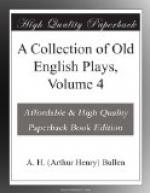[28] i.e. had I known. “A common exclamation of those who repented of anything unadvisedly undertaken.”—Nares.
[29] 4to. “tell.”
[30] Equivalent to a dissyllable (unless we read “damned").
[31] Baynard’s Castle, below St. Paul’s, was built by a certain Baynard who came in the train of William the Conqueror. It was rebuilt by Humphrey, Duke of Gloucester, and was finally consumed in the Great Fire of London.
[32] Perhaps this speech should be printed as verse.
[33] Own.
[34] 4to. “this.”
[35] 4to. “This.”
[36] 4to. “misguiseth.”
[37] White was a term of endearment,—as in the common expression white boy.
[38] 4to. “ease-dropping.”
[39] Dwell.
[40] Deformed, ugly (lit. branded with an iron).
[41] Cf. Middleton’s Trick to Catch the Old One, V. 2:—
“And
ne’er start
To be let blood though
sign be at heart;”
on which passage Dyce remarks that “according to the directions for bleeding in old almanacs blood was to be taken from particular parts under particular planets.”
[42] Is admitted to “benefit of clergy.” Harrison, in his Description of England, tells us that those who “are saved by their bookes and cleargie, are burned in the left hand, vpon the brawne of the thombe with an hot iron, so that if they be apprehended againe, that marke bewraieth them to have beene arraigned of fellonie before, whereby they are sure at that time to have no mercie. I doo not read that this custome of saving by the booke is vsed anie where else then in England; neither doo I find (after much diligent inquirie) what Saxon prince ordeined that lawe” (Book II. cap. xi.). See the article Clergie in Cowell’s Interpreter (1637).
[43] Brand.
[44] Therefore acted by the Queen of Bohemia’s Company who at that time occupied the Cockpit.—F.G. Fleay.
[45] Some seven or eight years ago I pointed out in Notes and Queries that the idea of this droll incident was taken from a passage of Timaeus of Tauromenium (see Athenaeus, Deipnosoph., ii. 5); but others—as I afterwards learned—had anticipated my discovery.
[46] This and the following speech are marked for omission in the MS.
[47] The words “Not so, frend,” are scored through.
[48] The words “Frenshe monster” are scored through.
[49] “Makarel” = maquerelle (a bawd).
[50] This passage illustrates 2 Henry IV., iv. 2:—“This Doll Tearsheet should be some road.” See my note on Middleton’s Your Five Gallants (Works, vol. iii. p. 220).
[51] Small boats with narrow sterns (Fr. pinque). Cf. Heywood’s I Edward IV.:—“Commend me to blacke Luce, bouncing Bess, and lusty Kate, and the other pretty morsels of man’s flesh. Farewell, pink and pinnace, flibote and carvel, Turnbull and Spittal” (Works, i. 38).




